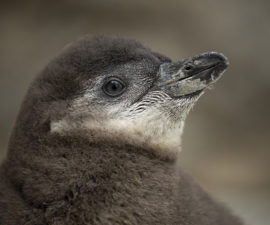Zoo InternQuest is a seven-week career exploration program for San Diego County high school juniors and seniors. Students have the unique opportunity to meet professionals working for the San Diego Zoo, Safari Park, and Institute for Conservation Research, learn about their jobs and then blog about their experience online. Follow their adventures here on the Zoo’s Website!
 How would you feel if you were stuck inside of your house all day, every day? Wouldn’t you go stir crazy without something to do? In the past, zoo animals could often be seen pacing back and forth and other repetitive behaviors due to an excess of energy. So, how does the zoo combat these behaviors? Enter Jessica Sheftel, the Enrichment Supervisor at the Welfare Department for the San Diego Zoo.
How would you feel if you were stuck inside of your house all day, every day? Wouldn’t you go stir crazy without something to do? In the past, zoo animals could often be seen pacing back and forth and other repetitive behaviors due to an excess of energy. So, how does the zoo combat these behaviors? Enter Jessica Sheftel, the Enrichment Supervisor at the Welfare Department for the San Diego Zoo.
Ms. Sheftel works to keep the animals occupied and encourages natural behaviors that would be seen in the wild. She spends her days working with different keepers throughout the Zoo who know specific information on the behaviors and moods of the animals in their care. An example of the work she does can be seen in the elephant exhibit, where their food is raised and lowered from a winch based on the time of day. This encourages the elephants to reach up, as opposed to simply feeding them from the ground, which requires no effort. Ms. Sheftel says that koalas are the hardest animals to enrich because they are such sedentary creatures. How do you entertain an animal that eats and sleeps most of the time? Ms. Sheftel has worked to provide platforms and ropes for use by the koalas to try to encourage different ways on moving around. She also told interns of one of her favorite enrichment opportunities. At one time there was a wild beehive at the Zoo that needed to be removed, resulting in an abundance of honeycomb. Ms. Sheftel was able to feed this to the resident Andean bear by placing it in a high place, requiring the bear to stand up on his hind legs to reach. She said this was the first time she has seen the bear so interested in something. Ms. Sheftel also attends many research conferences to further her knowledge of animal enrichment and foster an international community. She just recently attended the Animal Behavior Management Alliance’s Conference at the Cincinnati Zoo and has also visited many conferences held by the Associations of Zoos and Aquariums. Animal enrichment is an ever-evolving field and Ms. Sheftel is happy to promote it everywhere.
Ms. Sheftel first got her degree in anthropology with a focus on primatology and minored in animal behavior. While she was getting her degree, she spent a semester studying abroad in Tanzania at the University of Darsasalam as part of an immersive program. Ms. Sheftel said that she learned more during this semester abroad than she did at any other time in her college career because of the valuable research experience that she gained. While she was in Tanzania, Ms. Sheftel met a professor who introduced her to a member of the Zoo Atlanta. Ms. Sheftel attained a job at the Zoo Atlanta where she worked with bonobos. She merged her primatology major and animal behavior minor, teaching bonobos lexigrams. Lexigrams are symbols that represent words, so the bonobos were basically learning a rudimentary version of language. Eventually, she got a job at the San Diego Zoo and moved here to work in the Children’s Zoo.
Ms. Sheftel worked in the Children’s Zoo for eight years before getting the chance to change to the Welfare Department as the Enrichment Supervisor. Now, Ms. Sheftel hopes to expand the enrichment staff at the Zoo. She hopes to create a manager position of enrichment to oversee two Enrichment Supervisors. Ms. Sheftel wants to accomplish this goal because right now she has to work with the entire San Diego Zoo and Safari Park, a job that is very difficult for one person. Thankfully, she still had time to work with the interns and gave a very informative presentation. The best part was the follow-up activity where interns built models of enriched enclosures to house various animals. It quickly became apparent that it is very difficult to create a safe yet interesting environment for something to live in, helping the interns to appreciate Ms. Sheftel’s job.
It almost seems like magic how Ms. Sheftel was able to get her job at Zoo Atlanta because of her trip to Tanzania but there is a very important and applicable lesson to be learned from it. To To meet new people and get new opportunities, you have to leave your comfort zone. Going out of her way to try new things helped Ms. Sheftel get to where she it today: in a very tough but very rewarding job. Ms. Sheftel is able to persevere thanks to her combination of creative thinking and administrative skills, helping to keep the animals at the San Diego Zoo happy and healthy.
Ethan Good, Careers
Week Three, Fall Season 2016


